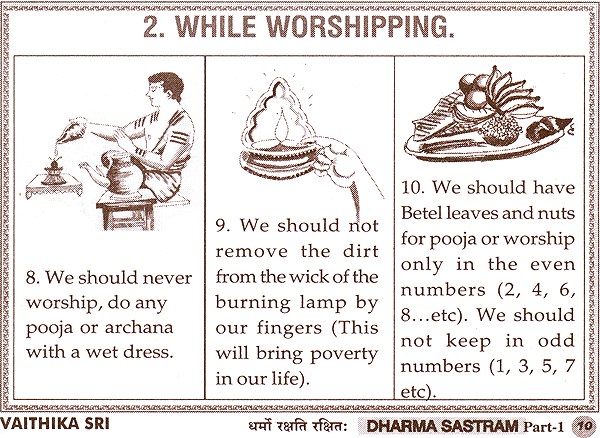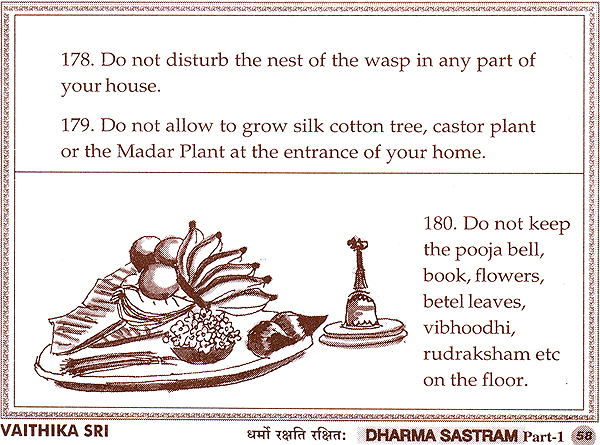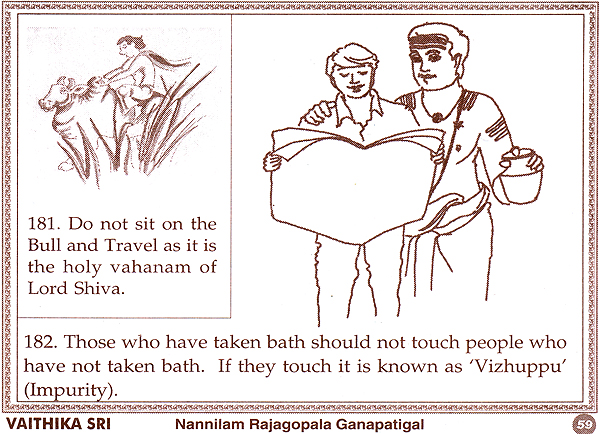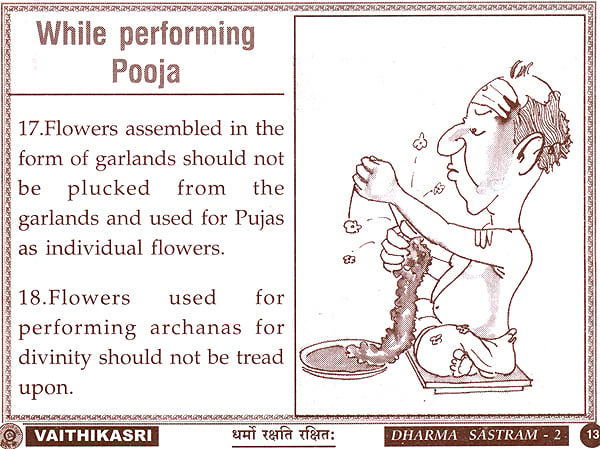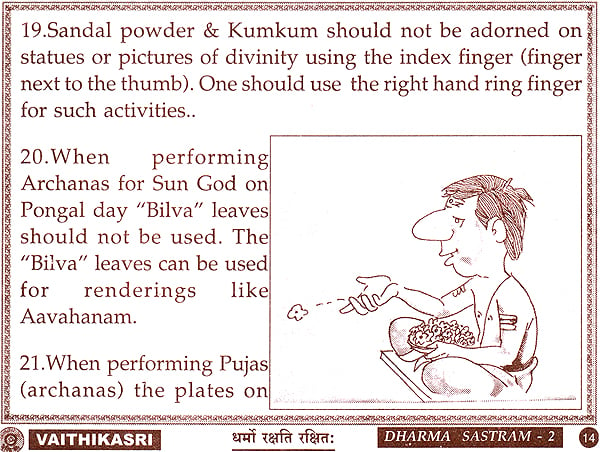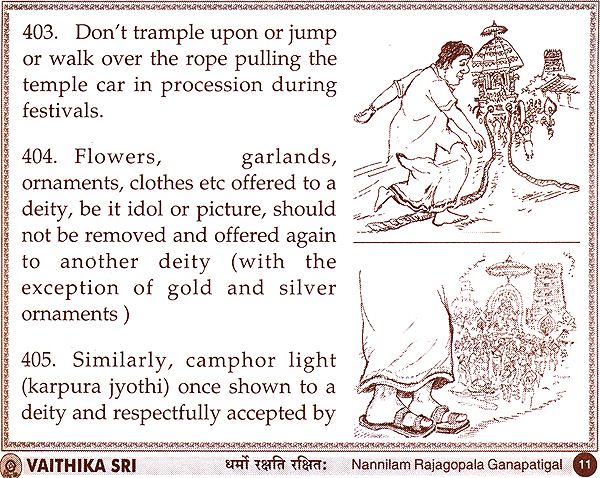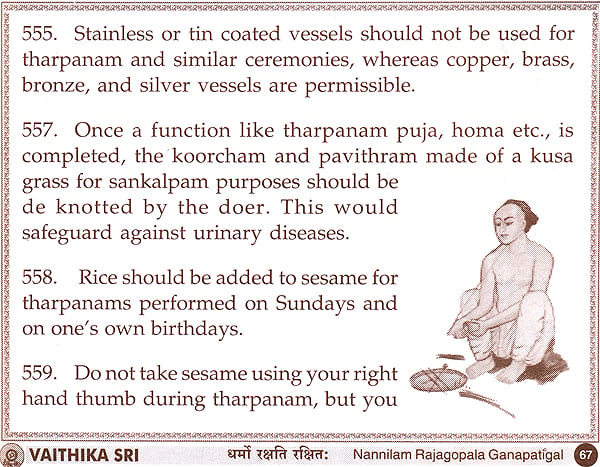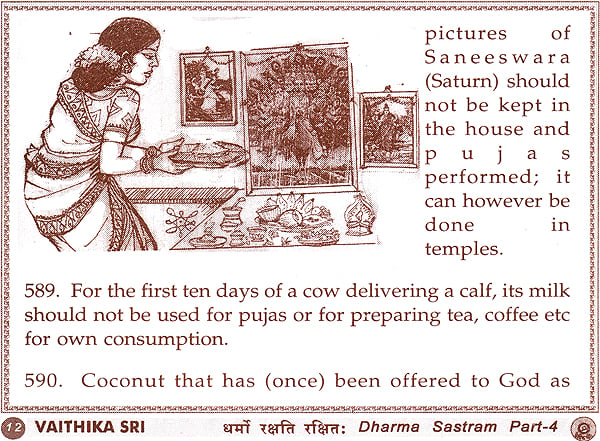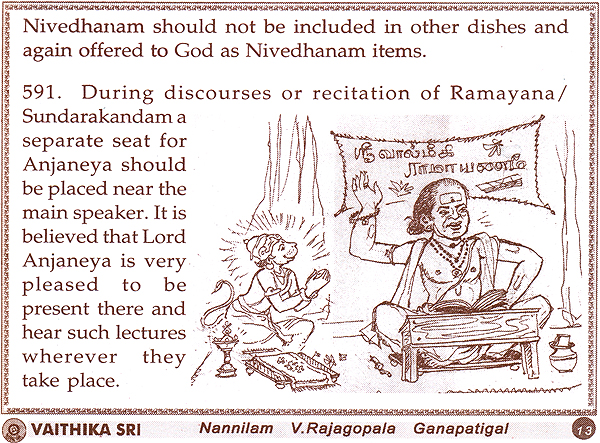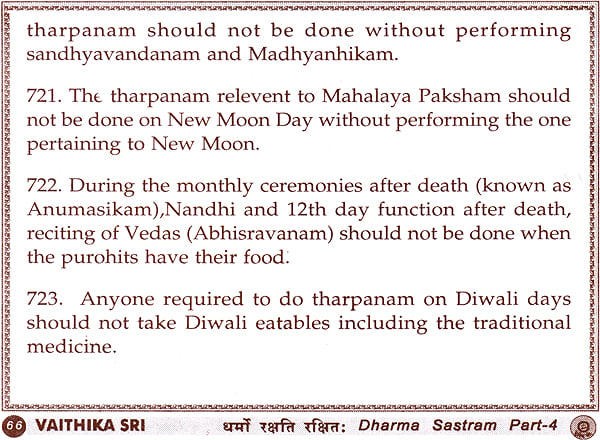
Dharma Sastram (Ethical Ethics Don't! Don’t! Don’t!)
Book Specification
| Item Code: | NAN001 |
| Author: | V. Rajagopala Ganapatigal |
| Publisher: | Vaithika Sri Publications LLP, Chennai |
| Language: | English |
| Edition: | 2018 |
| ISBN: | 9789384174095 |
| Pages: | 340 (Throughout Color Illustrations) |
| Cover: | Paperback |
| Other Details | 4.5 inch x 5.5 inch |
| Weight | 220 gm |
Book Description
It goes to the credit, erudition, penance & foresightedness of the great sages who adorned our holy contry, to have laid down the various tenets for our daily life, all based on scientific wisdom. Their teachings, known as Dharma Sastra, bestow on us valuable guidelines of how to lead a virtuous and meaningful life from birth to death, particularly in relation to things and other living beings. Lord Krishna in Bhagawath Gita Highlights the paramount importance of the Darma Sastra thus :
Yah sastra-vidhim utsrujya vartante kama- kaaratha:
na sa sidhhim avaapnoti na sukham na param gatim (16-23)
(One, who transgresses the injunctions of the Vedic scriptures whimsically acting under the impulse of desire, never attains perfection, neither happiness nor the supreme goal)
The word sastra refers exclusively to the Vedic scriptures. Vidhi means the injunctions and ordinances within them. The Vedic scriptures are the Supreme Lord Krishna’s mandates. Whosoever foolishly abandons these instructions and utsrjya or transgresses the injunctions and ordinances to drift whimsically wherever their desires aimlessly take them will never achieve siddhi or perfection beyond mundane conceptions, never achieve sukham or happiness of any longevity or param gatim the supreme goal of human existence. Further, as the saying goes.
Tasmac sastram pramanam te karyaakarya-vyavasthitau
Jnathva sasra-vidhanoktham karma karthum iharhasi (16-24) (Therefore the injunctions of the Vedic scriptures in ascertaining what should be done and what should not be done are your authority; knowing the ordinances of the Vedic scriptures as prescribed, you should perform actions in this word as a matter of duty).
Sastra meaning the Vedic scriptures is the sole absolute supreme authority deciding all matters of existence guiding all creation as to what is to be done and what is not to be done. What the ordinances and injunctions of the Vedic scriptures enjoin along with their auxiliaries such as the Puranas, Upanisads, Itihasas, etc reveals that the highest truth is the Supreme Lord Krishna, that all activities should be engaged in as devotion and propitiation to Him and that this in itself constitutes the means of attaining Him.
Realising these ultimate truths to be absolute reality, nothing more is required and one should sagaciously act with full faith in accordance therewith.
He alone qualifies to be called a man who performs all his deeds in total conformity with the sastras, otherwise he is demonish. Other who behave and act, following the whims and dictates of mind can, at best, be equated with monkeys. The famous saying goes ‘mind is a monkey’
Discipline of previous generations has regretfully decayed in the present day world, mainly due to lack of proper advice, good association and appropriate teachers. The young generations are at a loss to comprehend what to do and what not, not do they display even the inclination of learn and assimilate the sastraic prescriptions. Their children also naturally miss the timely advice at the right age.
Consequently, book on Dharma Sastra which are both comprehensive and simple are of limited availability, and even those available do not command wide readership. Persons who show keenness and inquisitiveness, do not get sufficient opportunities, nor the time due to other work pressure and strains. In this scenario, therefore, lectures on the subject with deep sastraic knowledge, and also the audience, are few and far between.
For the benefit of those who are not familiar with some of the Sanskrit or Tamil words used, a glossary is appeared at the end of reference. We pray God of Dharma and our Bhagwan to help us to follow this eternal and blissful path.
“Veda Vidyalankaara” “Vidya Rathnam” “Veda Visharada”
“Sanskrit Rathna” “Salakshana Vidwan” “Nannilam”
Brahmasri
| A Few words with you | 1 | |
| At the Temple | 7 | |
| While Worshiping | 10 | |
| During the Pooja | 12 | |
| Bathing(Snanam) | 16 | |
| Dressing | 17 | |
| Food Habits | 19 | |
| At the Bed Time | 25 | |
| For Gents | 27 | |
| For Ladies | 30 | |
| During the Specified- Time | 32 | |
| Self Control | 36 | |
| Prosastration (Namaskaram) | 48 | |
| Good Ceremonies (Functions) | 50 | |
| Pithru Puja | 53 | |
| Other in general | 57 |
| At Worship | 7 | |
| While performing Pooja | 13 | |
| While performing Homa | 19 | |
| At the temple | 24 | |
| What to do when specific times | 34 | |
| Self- discipline | 37 | |
| Bathing- Clothing | 45 | |
| Food Habits | 49 | |
| While Sleeping | 59 | |
| For Gentlemen | 60 | |
| For Ladies | 68 | |
| Namaskaram | 71 | |
| Travel | 74 | |
| Auspicious Occasions/ceremonies | 77 | |
| Pithru Poojanam | 82 | |
| Miscellaneous | 92 |
| Preface | 4 | |
| Worship of god | 10 | |
| Temple Premises | 17 | |
| Puja (Worship) | 23 | |
| Japam & Homam | 30 | |
| Namaskarams | 35 | |
| Timeliness | 37 | |
| Individual Conduct | 40 | |
| Bathing and Dressing | 42 | |
| About Food Habits | 45 | |
| For gentlemen | 49 | |
| For Women | 51 | |
| Travels | 56 | |
| About condolence routines | 59 | |
| Ceremonies for ancestors | 60 | |
| Holy Auspicious Functions | 70 | |
| Miscellaneous | 75 | |
| Glossary | 77 |
| Preface | 04 | |
| Worship of god | 10 | |
| Temple premises | 15 | |
| Puja (Worship) | 19 | |
| Japan & Homam | 25 | |
| Namskarams | 33 | |
| Timeliness | 34 | |
| Individual Conduct | 37 | |
| Bathing and Dressing | 46 | |
| About Food Habits | 48 | |
| For gentlemen | 51 | |
| For Women | 56 | |
| Travels | 63 | |
| Ceremonies for ancestors | 65 | |
| Annual Ceremonies | 69 | |
| Holy Auspicious Functions | 74 | |
| Miscellaneous | 82 | |
| Glossary | 88 |
